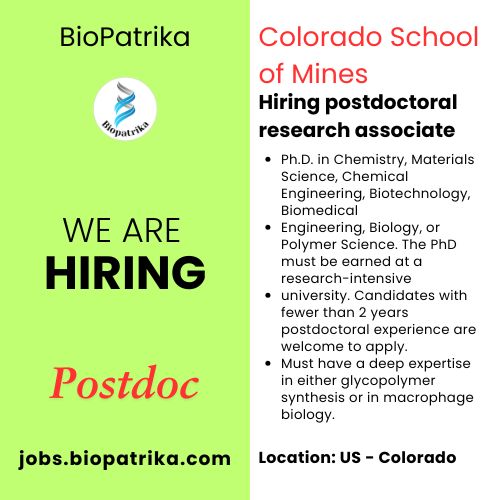Hiring postdoctoral research associate – Colorado School of Mines
Job Overview
-
Date PostedSeptember 10, 2025
-
Location
-
Expiration dateOctober 10, 2025
-
Click to apply:
Job Description
The Kumar biomaterials lab at the Department of Chemical and Biological Engineering at Colorado
School of Mines (Mines) is seeking a highly driven postdoctoral research associate. We are looking
for someone with a strong track record of excellence in research and mentorship to work on an NIGMS-
funded project. The candidate will synthesize cell culture substrates based on ligand-modified polymer
brushes and mapping how spatial presentation of biochemical cues influences macrophage fate. The
successful candidate will have the chance to work in a young, dynamic, collaborative lab in a supportive
environment that nurtures trainees’ scientific potential and promotes excellence and team science.
Trainees have won 21 awards (including nationally competitive scholarships such as NSF GRFP,
Goldwater, Beckman, and Amgen) in the last 3 years. The PI is fully committed to helping postdocs
fulfill their career goals in academia and obtain independent faculty positions at the end of their training.
Her first postdoctoral mentee has been highly successful and will be starting his own lab in India. We
welcome trainees from all non-traditional backgrounds. We are proud of a culture where everyone,
irrespective of gender identity, sexual orientation, race, ethnicity, caste, national origin, religious
affiliation, and socioeconomic status, can thrive and grow.

Project description
Macrophage polarization plays important roles in wound healing, inflammation, and cancer progression.
This project uses polymer brushes—ultra-thin polymer coatings made by grafting polymers from
substrates—to present ligands in controlled spatial patterns and study how macrophages respond to
changes in ligand presentation and chemical identity. The postdoc will synthesize polymer brushes
functionalized with different glycan-based ligands and interrogate how ligand identity, density, and
spatial presentation influence macrophage polarization and phenotypic expression.
Responsibilities and duties
- Synthesize and characterize glycopolymer brushes.
- Surface analytical techniques such as XPS, ellipsometry, and AFM.
- Culture macrophages on cell culture substrates based on polymer brushes.
- Apply ELISA, scRNAseq, advanced imaging methods to characterize macrophage phenotypes.
- Data analysis, maintaining careful lab notebook records, data management.
- Present findings at lab meetings and conferences, prepare manuscripts for publication, prepare
progress reports. - Mentor students and handle lab management tasks (purchasing and expense reports,
maintaining cell culture facility, maintaining flow cytometer).
Minimum qualifications (must have all below) - Strong motivation to spend lots of time in lab and a deep commitment to learning and continually
improving research skills. - Academic craftsmanship (figure making, slide design, academic writing, giving talks/posters).
- Ph.D. in Chemistry, Materials Science, Chemical Engineering, Biotechnology, Biomedical
Engineering, Biology, or Polymer Science. The PhD must be earned at a research-intensive
university. Candidates with fewer than 2 years postdoctoral experience are welcome to apply. - Must have a deep expertise in either glycopolymer synthesis or in macrophage biology.
- Must have extensive experience trouble shooting cellular and biological assays.
- Track record of research excellence demonstrated through peer-reviewed publications in top-
tier specialist journals (preferably ACS or RSC journals). - Strong letters indicating candidates’ ability to ideate research directions independently, work
hard, respond constructively to feedback, and work harmoniously in a diverse team. - Leadership and problem-solving. Must be a go-getter rather than passively await instructions.
- Interpersonal skills and emotional maturity for interdisciplinary work, inter-lab collaboration, and
mentoring undergraduate and graduate students at Mines. Cultural intelligence is a must-have. - Excellent written and oral communication skills and a deep desire to improve these continually.
Desired qualifications (must have at least 2 of 5 below) - Expertise in macrophage culture, polarization, and characterization.
- Expertise in carbohydrate chemistry, glycomonomers synthesis, glycopolymer synthesis,
bioconjugation, post-polymerization modification. - At least 3 years’ experience in mammalian cell culture.
- Quantitative confocal fluorescence microscopy.
- Acquiring and analyzing scRNAseq data.
Terms of employment - Initial appointment for 1 year. If performance is satisfactory, will be extended to 3 years total.
- The candidate must commit to staying in the position for at least 2-3 years.
- Start date: Jan 2026
- NIH-budgeted salary and fringe benefits (including Mines-subsidized health care and employer
contributions to a retirement fund) - A small amount may be provided for reasonable moving expenses. This is subject to budget
constraints. - The lab is committed to maintaining research integrity by performing rigorous and reproducible
research. Research misconduct will result in immediate investigation and swift termination of
employment if found guilty. - There is zero tolerance for sexual harassment, bullying, and discriminatory behavior.
Disrespectful, intimidatory, and aggressive behaviors that threaten the safety and well-being of
lab and departmental colleagues will invite immediate investigation and swift termination of
employment.
Application instructions
Please read carefully. Applications that do not comply with instructions will not be reviewed. - Include CV, 1-page cover letter describing why you want this position, three of your best first-
author papers, and contact information for three references. Combine in a single application pdf.
Do not send word files or any other file type. Do not send multiple pdfs. - References will be contacted only for the finalists. Do NOT include letters of recommendation.
- Email application to ramyakumar@mines.edu with the subject “MIRA postdoc applicant”. If
subject does not match this exactly, the email will be filed as junk. - Do NOT include personal photographs or research figures in application.
- Do NOT contact the PI (Prof. Ramya Kumar) in any other manner.
- After preliminary zoom interviews, 3 finalists will be invited for a final round of interviews.
- Applications will be until the positions is filled.




